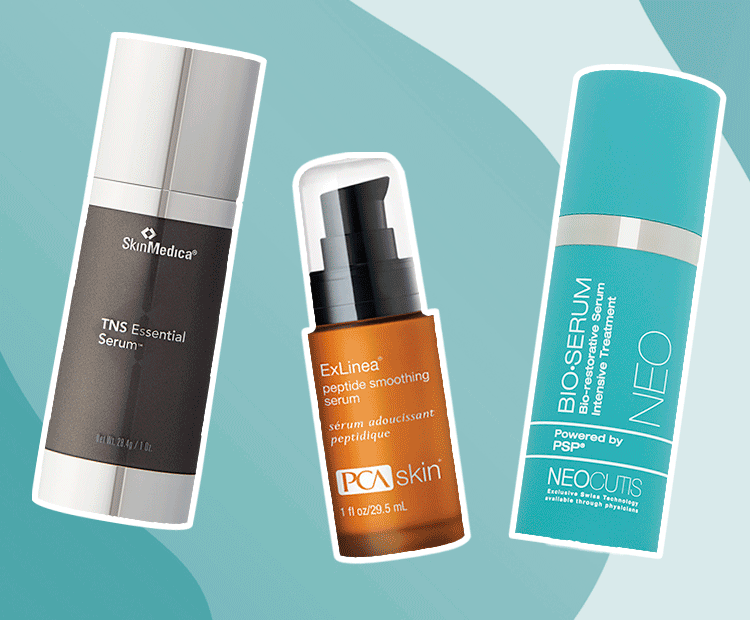You’ve likely heard the buzz around peptides as an anti-aging must-have and hero ingredient to smooth, repair and hydrate skin, but have you ever wondered what a peptide is and what it does for the skin, exactly? More important, is having it as one of the key ingredients in your skin care products worth the hefty price tag? The short answer, according to two prominent dermatologists, is yes.
The Basics: What Are Peptides and What Do They Do?
Before we talk about peptides, it’s important to understand what amino acids are. “Peptides are strings of amino acids, which are the building blocks that make up proteins in our body, including collagen in the skin,” explains Dr. Whitney Bowe, renowned New York City–based dermatologist and author. “Without these proteins, we will see wrinkles, brittle nails and dry hair that’s prone to breakage.” “Peptides serve as the building blocks for not only new collagen, but also elastin fibers,” adds Dr. Deanne Mraz Robinson, partner at Modern Dermatology in Westport, CT. “These fibers are the building blocks of our skin and add to tissue firmness and elasticity.” Aside from being essential to the skin’s structure and function (important factors in firmness, texture and overall appearance), peptides are found in every human cell and play an important role in how the body functions, often acting as a biologic messenger. “We need peptides at all times. If we are deficient in them, our body cannot function,” says Dr. Robinson. “Peptides have a myriad of uses in the body, from being the building blocks for enzymes, hormones and an energy source.”
How Peptides in Your Skin Care Work
So if peptides are already present within the body, why do we need more of them? The answer, according to experts, is aging. “We lose 1% of our remaining collagen per year after age 30,” says Dr. Robinson. “Our skin’s natural communication channels also slow down over time.”
But simply slathering peptides onto your skin doesn’t necessarily give you more of them. According to Dr. Bowe, how they work is a little more complex: “Your body sees these peptides as ‘signals’ that you need to heal, which tells your body to produce more collagen where you need it most,” she explains. “If you are healing from an injury in your ankle, those peptides will signal your body to focus its repair efforts in that joint. If your skin is aging prematurely, those peptides might signal your skin to boost its production of collagen and even hyaluronic acid, plumping up your skin and restoring a healthy skin barrier. When you introduce exogenous peptides onto the skin in the form of a moisturizer or serum, it tricks the skin into thinking there’s been an injury or wound, and it stimulates our collagen-boosting processes.”
When it comes to skin care, not all peptides are created equal. “While there are hundreds of peptides, there are specific peptides that are more efficacious for the skin than others,” explains Dr. Robinson. For example, carrier peptides deliver trace minerals to the skin to boost collagen, while enzyme inhibitor peptides work to slow down the skin’s natural breakdown of collagen. Signal peptides send messages to different parts of the skin to promote collagen, elastin and other proteins; and neurotransmitter peptides, touted as “Botox-like,” block the release of chemicals that cause the muscle contraction of expression lines, thus smoothing wrinkles.
How to Get More Peptides
When it comes to enhancing the skin, Dr. Bowe recommends getting peptides from topical skin care products. However, she stresses the importance of looking at the product’s formulation: the stability of its ingredients and its ability to penetrate the skin barrier. This is where a consultation with your dermatologist may be helpful.
Finding the right product type can go a long way too. For example, instead of choosing a peptide-enriched cleanser, Dr. Robinson recommends opting for products that are not easily washed off the skin, like a moisturizer, eye cream or serum. She also suggests opting for products with copper peptides, which “help not only generate collagen but also maintain the collagen you generate.” She also suggests looking for products that also introduce niacinamide, vitamin C and antioxidants into the mix, in addition to peptides.
Once you find the right cream or serum for you, Dr. Robinson recommends applying it to clean skin twice daily, under makeup and SPF.
Aside from topical products, incorporating collagen-rich foods like bone broth, and adding a reputable collagen supplement to your diet, can also work wonders for your skin.


